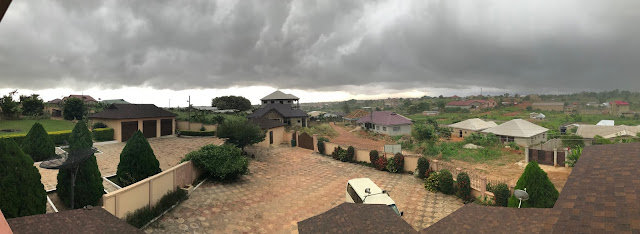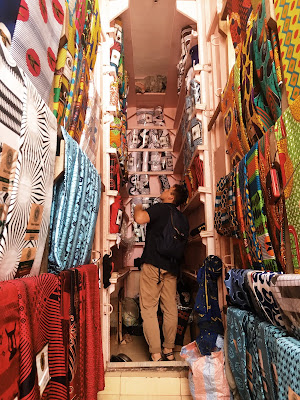Over Dinner
I had a great conversation with Dr. Seth
over dinner.
Seth is one of the 95 or so ophthalmologists in Ghana . has been
our gracious host as we have been working with his team in Kumasi and
surrounding regions. Unfortunately, due to scheduling conflicts, the other
volunteers and I haven’t been able to have much time working with him. But over
dinner we talked a little about the accessibility of eye care in Ghana. Of the
total ophthalmologist in Ghana about have practices in Ghana, about 50 of them
work in and around Accra, the capital city. Of the remaining about 25 or so
live in and around Kumasi, the second largest city in Ghana. The rest, a number
somewhere around 25 or so are scattered across the rest of Ghana. This lack of
skilled personal according to Dr. Seth leave many regions without access to
modern eye care.
 These first couple of days in Kumasi have been pretty slow.
Most of the areas we are seeing have been seen in recent months by other eye
clinics. Due to this we have had a low patient load. I’m not going to lie. It
feels like we’re not accomplishing much… at least that part of the thoughts
that have been going through my head. However these thoughts of feeling like I
haven’t been much of a help in curing blindness or helping improve the
healthcare infrastructure of Ghana, are strongly juxtaposed to this singular thought.
We are winning the fight at least in this small region around Kumasi. I have
been talking with Josiah, the optometrist that the group I’m with have been shadowing
and he has explained more than once that the lack of strong attendance at our
outreach has been due to other clinics visiting the same region recently.
These first couple of days in Kumasi have been pretty slow.
Most of the areas we are seeing have been seen in recent months by other eye
clinics. Due to this we have had a low patient load. I’m not going to lie. It
feels like we’re not accomplishing much… at least that part of the thoughts
that have been going through my head. However these thoughts of feeling like I
haven’t been much of a help in curing blindness or helping improve the
healthcare infrastructure of Ghana, are strongly juxtaposed to this singular thought.
We are winning the fight at least in this small region around Kumasi. I have
been talking with Josiah, the optometrist that the group I’m with have been shadowing
and he has explained more than once that the lack of strong attendance at our
outreach has been due to other clinics visiting the same region recently.
This victory in the Kumasi presents a new problem. A better
problem in my mind. How do the optometrists in and around Kumasi work to coordinate
their outreaches so that the time and resources spent by each clinic are used
wisely. This is something that I have been thinking quite a bit about. It is
easy to fall into a pattern of behavior and to lose the guiding star of your
practice or life. In Kumasi it seems like modern eye care is accessible and
affordable. The question is how do we connect the more rural areas to modern
health care and eye care?
I think the answer may be in the book, Second Suns written
by David Relin, that I have been reading about Dr. Geoffrey Tabin and Dr.
Sanduk Ruit, the founders of the Himalayan Cataract Project and pioneers in Small
Incision Cataract Surgery or SICS. The first SCIS I watch was at the St. Thomas
Eye Hospital. After a several days on outreach in the Cape Coast area, we were bused
back into Accra to watch surgeries. The cases were fascinating. I watched as
cloudy damaged lenses were replaced with Intraocular lenses. The blind were
literally given back their eyes. And to make it more amazing the surgeries only
took around 7 minutes barring complications or power outages.
In the book Second Suns, highlights unity and growth of eye care
of Nepal’s poor and the impoverished communities of surrounding regions. The
book highlights the difficulties of expanding care and building a world class
institution while underfunded and in subpar conditions.
It turns out that Dr. Seth has actually met Geoff Tabin.
Tabin comes to meet with the ophthalmologists of Ghana yearly and teaches new
techniques and preforms surgical. He seems to agree with the view of the author
of Second Suns that Dr. Tabin has a ton of energy and passion. The Himalayan
Cataract Project built a world class training hospital, build a spider web of
interconnected hospitals that provide world class care. I understand that each
doctor approached the problem different, but statistically the Himalayan process
for solving preventable blindness works and turns the tide.




Comments
Post a Comment